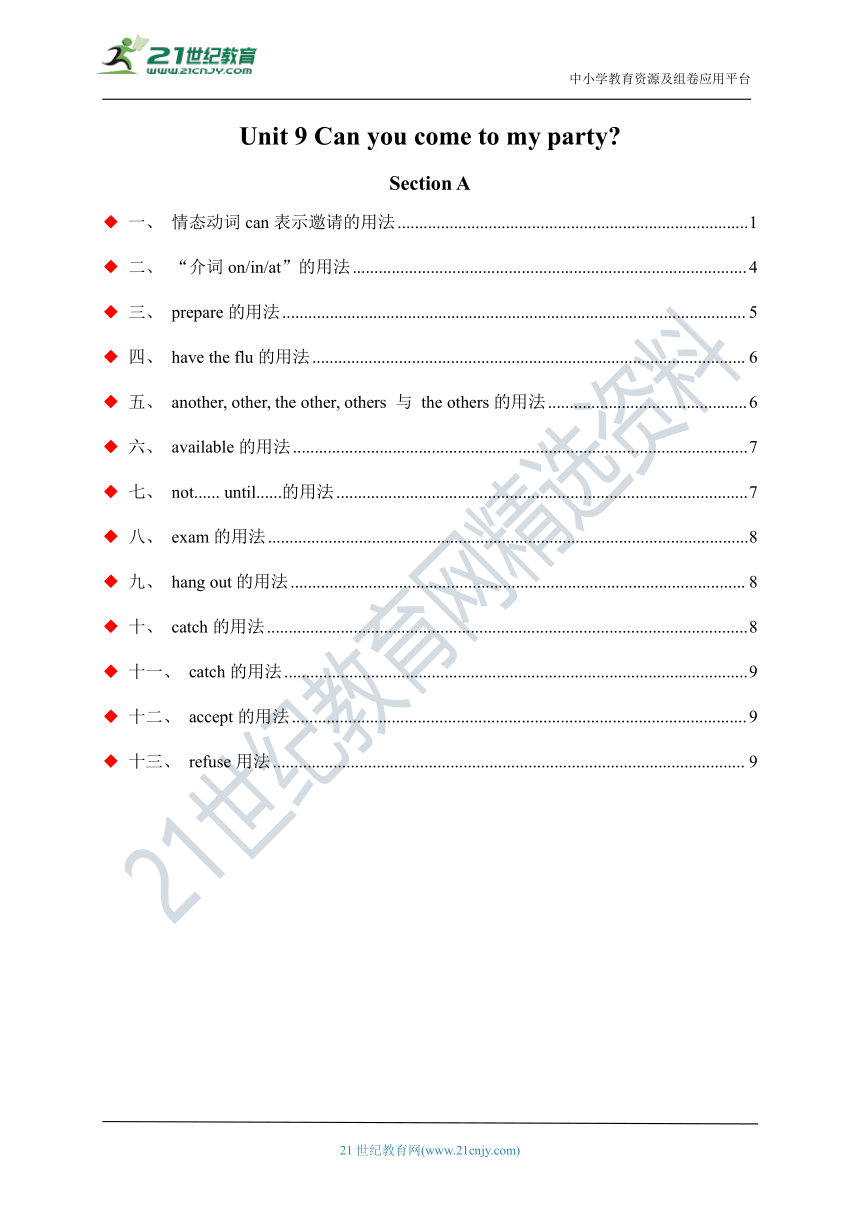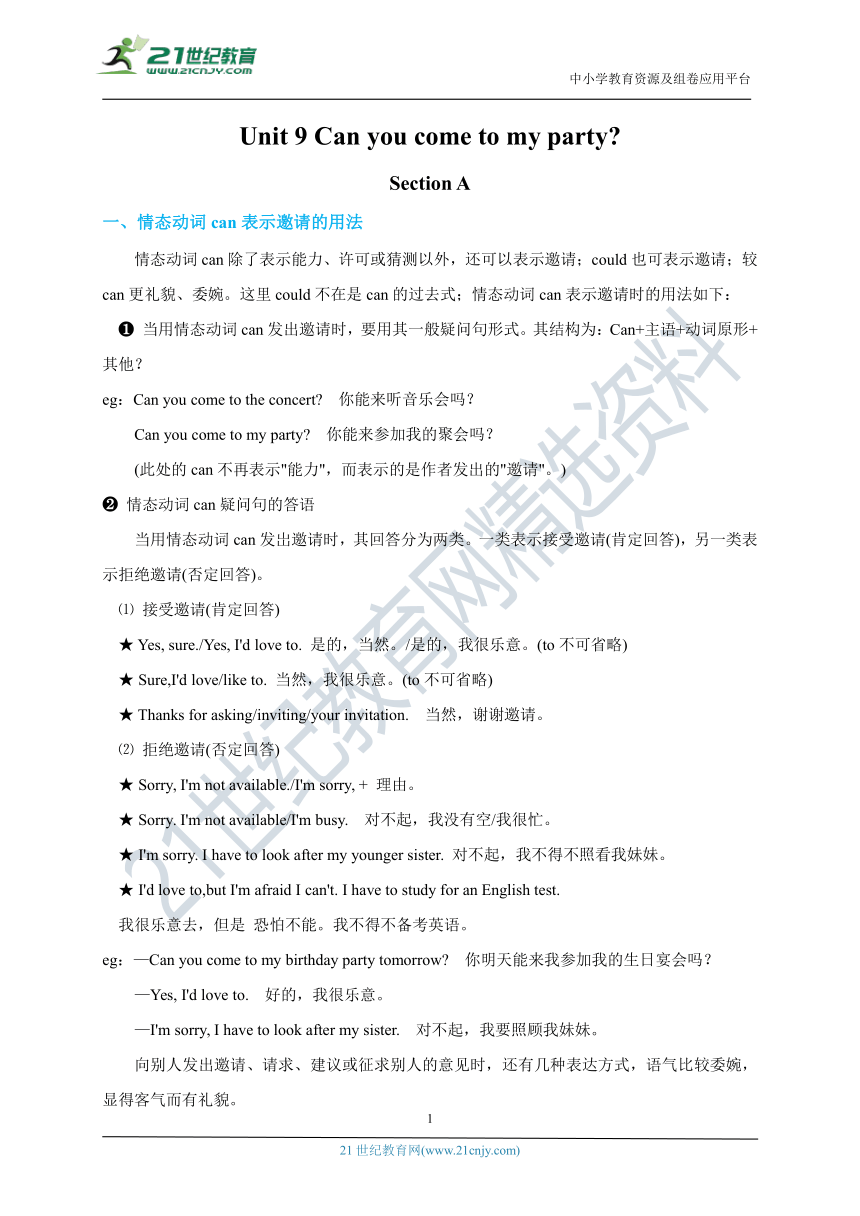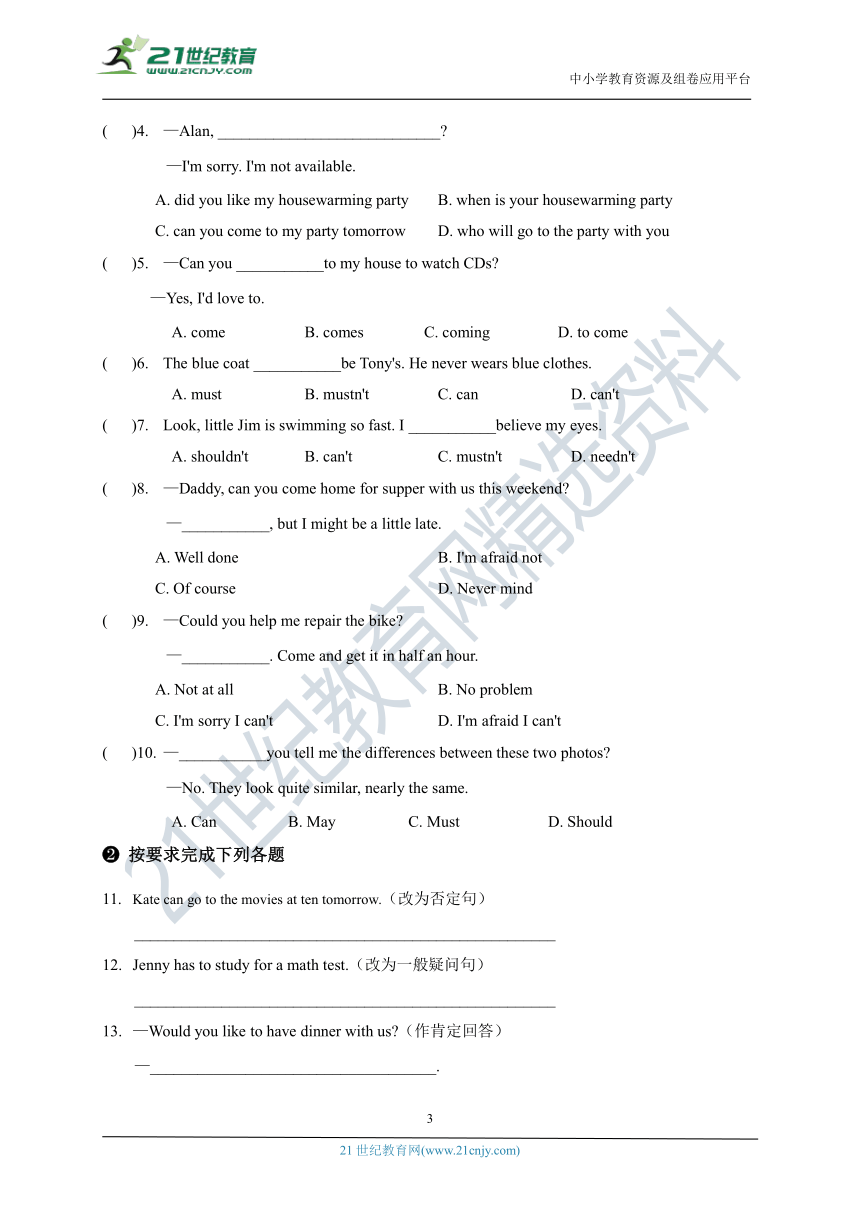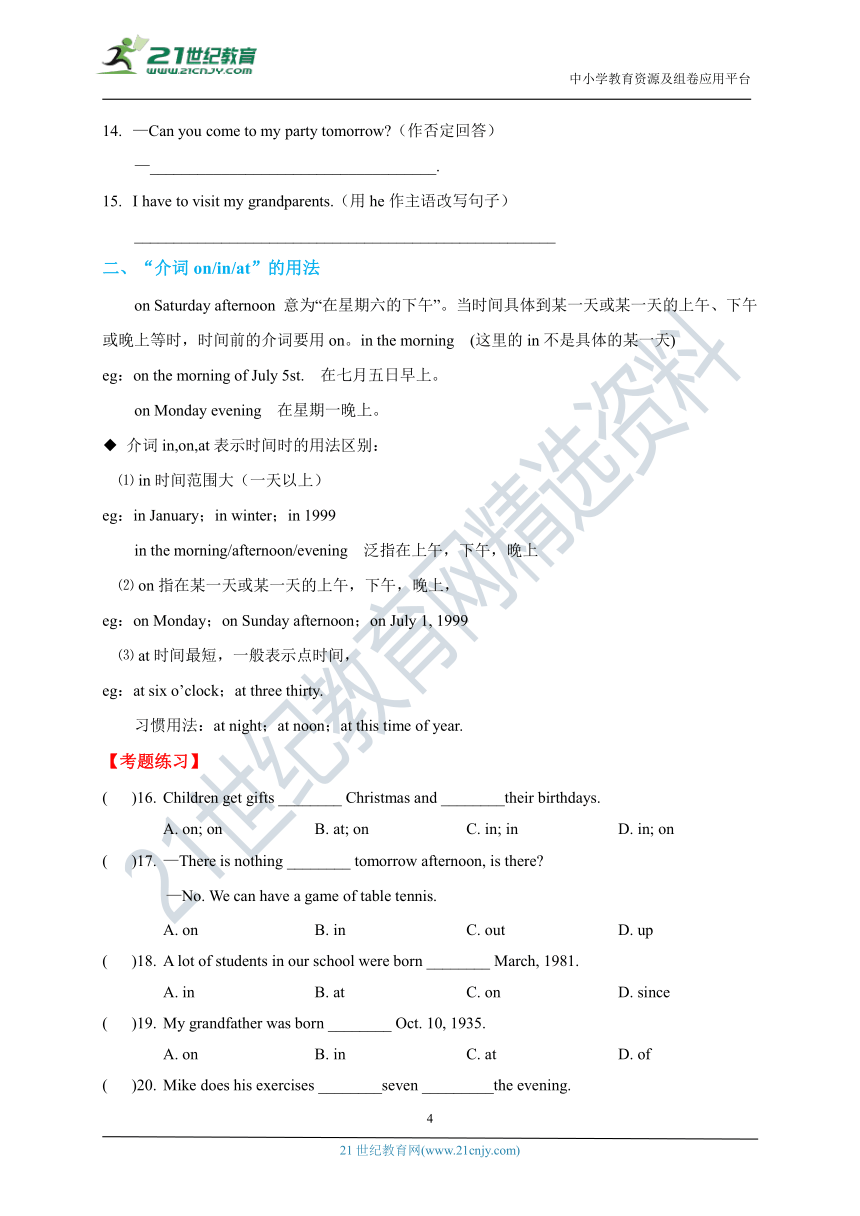Unit 9 Can you come to my party Section A 重要知识考点+练习过关 (含答案)
文档属性
| 名称 | Unit 9 Can you come to my party Section A 重要知识考点+练习过关 (含答案) |  | |
| 格式 | docx | ||
| 文件大小 | 1014.6KB | ||
| 资源类型 | 试卷 | ||
| 版本资源 | 人教新目标(Go for it)版 | ||
| 科目 | 英语 | ||
| 更新时间 | 2021-09-28 07:14:59 | ||
图片预览





文档简介
Unit
9
Can
you
come
to
my
party?
Section
A
一、
情态动词can表示邀请的用法
1
二、
“介词on/in/at”的用法
4
三、
prepare的用法
5
四、
have
the
flu的用法
6
五、
another,
other,
the
other,
others
与
the
others的用法
6
六、
available的用法
7
七、
not......
until......的用法
7
八、
exam的用法
8
九、
hang
out的用法
8
十、
catch的用法
8
十一、
catch的用法
9
十二、
accept的用法
9
十三、
refuse用法
9
中小学教育资源及组卷应用平台
21世纪教育网
www.21cnjy.com
精品试卷·第
2
页
(共
2
页)
21世纪教育网(www.21cnjy.com)
Unit
9
Can
you
come
to
my
party?
Section
A
情态动词can表示邀请的用法
情态动词can除了表示能力、许可或猜测以外,还可以表示邀请;could也可表示邀请;较can更礼貌、委婉。这里could不在是can的过去式;情态动词can表示邀请时的用法如下:
?
当用情态动词can发出邀请时,要用其一般疑问句形式。其结构为:Can+主语+动词原形+其他?
eg:Can
you
come
to
the
concert?
你能来听音乐会吗?
Can
you
come
to
my
party?
你能来参加我的聚会吗?
(此处的can不再表示"能力",而表示的是作者发出的"邀请"。)
?
情态动词can疑问句的答语
当用情态动词can发岀邀请时,其回答分为两类。一类表示接受邀请(肯定回答),另一类表示拒绝邀请(否定回答)。
⑴
接受邀请(肯定回答)
★
Yes,
sure./Yes,
I'd
love
to.
是的,当然。/是的,我很乐意。(to不可省略)
★
Sure,I'd
love/like
to.
当然,我很乐意。(to不可省略)
★
Thanks
for
asking/inviting/your
invitation.
当然,谢谢邀请。
⑵
拒绝邀请(否定回答)
★
Sorry,
I'm
not
available./I'm
sorry,
+
理由。
★
Sorry.
I'm
not
available/I'm
busy.
对不起,我没有空/我很忙。
★
I'm
sorry.
I
have
to
look
after
my
younger
sister.
对不起,我不得不照看我妹妹。
★
I'd
love
to,but
I'm
afraid
I
can't.
I
have
to
study
for
an
English
test.
我很乐意去,但是
恐怕不能。我不得不备考英语。
eg:—Can
you
come
to
my
birthday
party
tomorrow?
你明天能来我参加我的生日宴会吗?
—Yes,
I'd
love
to.
好的,我很乐意。
—I'm
sorry,
I
have
to
look
after
my
sister.
对不起,我要照顾我妹妹。
向别人发出邀请、请求、建议或征求别人的意见时,还有几种表达方式,语气比较委婉,显得客气而有礼貌。
?
Let's
+
do
sth.
咱们做某事吧。
eg:Let's
go
shopping.
咱们去购物吧。
Let's
play
football.
让我们踢足球吧。
?
Shall
we
+
do
sth.
?
我们做某事好吗?
eg:Shall
we
go
out
for
a
walk?
我们出去散步好吗?
?
Would
you
mind
(not)
+
doing
sth.
?
你介意(不)做某事吗?
eg:Would
you
mind
closing
the
door?
你介意关上门吗?
?
How/What
about
doing
sth.
?
做某事怎么样?
eg:How
about
playing
basketball?
打篮球怎么样?
?
You'd
better
(not)
do
sth.
你最好(不要)做某事。
eg:You'd
better
not
read
such
books.
你最好不要看这样的书。
?
Why
don't
you
do
sth.?=Why
not
do
sth.
?
(你)为什么不做某事呢?
eg:Why
don't
you
ask
your
teacher?
=Why
not
ask
your
teacher?
为什么不问你的老师呢?
?
Would
you
like
(
not)
to
do
sth.
?
你愿意(不)做某事吗?
eg:Would
you
like
to
have
a
rest?
你想休息一会儿吗?
?
Would/Could
you
please
(not)
do
sth.
?
请你(不要)做某事好吗?
eg:Would
you
please
wait
for
me?
请你
等等我好吗?
【考题练习】
?
选择题
—Can
you
go
to
the
supermarket
this
weekend?
—___________.
I
have
to
help
my
parents
with
housework.
A.
Sure,I'd
love
to
B.
I'm
afraid
so
C.
I'm
afraid
not
D.
Sure,I
love
—Can
they
play
basketball
with
us?
—No,they
are
not
___________.
They
have
to
meet
friends.
A.
busy
B.
free
C.
angry
D.
time
—Can
you
go
to
the
movies
with
us
tomorrow
night?
—___________
A.
Sure,
I'm
busy
B.
Sure,
I'd
love
to
C.
Sorry,
I'd
love
to
D.
I'm
sorry
I
can
—Alan,
____________________________?
—I'm
sorry.
I'm
not
available.
A.
did
you
like
my
housewarming
party
B.
when
is
your
housewarming
party
C.
can
you
come
to
my
party
tomorrow
D.
who
will
go
to
the
party
with
you
—Can
you
___________to
my
house
to
watch
CDs?
—Yes,
I'd
love
to.
A.
come
B.
comes
C.
coming
D.
to
come
The
blue
coat
___________be
Tony's.
He
never
wears
blue
clothes.
A.
must
B.
mustn't
C.
can
D.
can't
Look,
little
Jim
is
swimming
so
fast.
I
___________believe
my
eyes.
A.
shouldn't
B.
can't
C.
mustn't
D.
needn't
—Daddy,
can
you
come
home
for
supper
with
us
this
weekend?
—___________,
but
I
might
be
a
little
late.
A.
Well
done
B.
I'm
afraid
not
C.
Of
course
D.
Never
mind
—Could
you
help
me
repair
the
bike?
—___________.
Come
and
get
it
in
half
an
hour.
A.
Not
at
all
B.
No
problem
C.
I'm
sorry
I
can't
D.
I'm
afraid
I
can't
—___________you
tell
me
the
differences
between
these
two
photos?
—No.
They
look
quite
similar,
nearly
the
same.
A.
Can
B.
May
C.
Must
D.
Should
?
按要求完成下列各题
Kate
can
go
to
the
movies
at
ten
tomorrow.(改为否定句)
_____________________________________________________
Jenny
has
to
study
for
a
math
test.(改为一般疑问句)
_____________________________________________________
—Would
you
like
to
have
dinner
with
us?(作肯定回答)
—____________________________________.
—Can
you
come
to
my
party
tomorrow?(作否定回答)
—____________________________________.
I
have
to
visit
my
grandparents.(用he作主语改写句子)
_____________________________________________________
“介词on/in/at”的用法
on
Saturday
afternoon
意为“在星期六的下午”。当时间具体到某一天或某一天的上午、下午或晚上等时,时间前的介词要用on。in
the
morning
(这里的in不是具体的某一天)
eg:on
the
morning
of
July
5st.
在七月五日早上。
on
Monday
evening
在星期一晚上。
◆
介词in,on,at表示时间时的用法区别:
⑴
in时间范围大(一天以上)
eg:in
January;in
winter;in
1999
in
the
morning/afternoon/evening
泛指在上午,下午,晚上
⑵
on指在某一天或某一天的上午,下午,晚上,
eg:on
Monday;on
Sunday
afternoon;on
July
1,
1999
⑶
at时间最短,一般表示点时间,
eg:at
six
o’clock;at
three
thirty.
习惯用法:at
night;at
noon;at
this
time
of
year.
【考题练习】
Children
get
gifts
________
Christmas
and
________their
birthdays.
A.
on;
on
B.
at;
on
C.
in;
in
D.
in;
on
—There
is
nothing
________
tomorrow
afternoon,
is
there?
—No.
We
can
have
a
game
of
table
tennis.
A.
on
B.
in
C.
out
D.
up
A
lot
of
students
in
our
school
were
born
________
March,
1981.
A.
in
B.
at
C.
on
D.
since
My
grandfather
was
born
________
Oct.
10,
1935.
A.
on
B.
in
C.
at
D.
of
Mike
does
his
exercises
________seven
_________the
evening.
A.
on;
to
B.
at;
in
C.
by;
of
D.
at;
on
Children
wake
up
very
early
________
the
morning
of
Christmas
Day.
A.
in
B.
on
C.
for
D.
at
________a
cold
winter
morning,
I
met
her
in
the
street.
A.
In
B.
On
C.
At
D.
For
Why
did
you
get
up
so
early
________
this
morning.
A.
on
B.
/
C.
at
D.
in
He
went
to
Shanghai___
September
3,
1991
and
came
back___
a
cold
morning
last
year.
A.
in;
on
B.
on;
in
C.
on;
on
D.
in;
in
Lucy
was
born________the
night
of
May
12,
1984.
A.
on
B.
in
C.
at
D.
to
Ann
moved
________
Hangzhou
________
September,
1992.
A.
/;
in
B.
to;
in
C.
to;
on
D,
in;
in
He
often
goes
________school
________six
thirty
________the
morning.
A.
for;
to;
in
B.
to;
at;
in
C.
to;
for;
at
D,
for;
at;
to
19.
He
arrived
________
Shanghai
________
9:
30
________
March
5.
A.
at;
in;
at
B.
to;
on;
at
C.
in;
on;
at
D.
in;
at;
on
The
English
teacher
told
me
to
get
there
________
half
past
ten.
A.
in
B.
at
C.
on
D.
of
prepare的用法
用作不及物动词,意为“做准备”,也可用作及物动词,意为“使做好准备;把……预备好”,其名词形式为preparation,为“准备;准备工作”。常用短语:prepare
for(
=
get
ready
for)
意为“为……做准备”。
◆
prepare
to
do
sth.
意为“准备做某事”
◆
prepare
sb.
for
sth.
意为"使某人为某事做准备”。
【考题练习】
我不能和你一起去看电影,因为我不得不为考试做准备。
I
can't
go
to
the
movies
with
you
because
I
have
to
________
________
an
exam.
妈妈在准备传统晚宴,我们在为新年做准备。
Mom
________
________
the
traditional
dinner,
and
we
________
________
for
the
new
year.
他拿出一张纸,准备给父母写信。
Taking
out
a
piece
of
paper,
he
prepared
________
________
to
his
parents.
我们必须使她为这个坏消息做好准备。
We
must
________
her
________
the
bad
news.
have
the
flu的用法
flu名词,意为“流行性感冒;流感",常用短语have
the
flu意为"患流感"。flu前不用a,要用the。
“have
a/an
+表疾病的名词”
意为“患了……病”
这里用a/an;不用the
have
a
headache
头痛
have
a
toothache
牙痛
have
a
sore
throat
喉咙痛
have
a
cold
感冒
have
a
cough
咳嗽
have
a
fever
发烧
have
a
stomachache
胃痛
【考题练习】
她没去上学,因为她感冒了。
She
didn't
go
to
school,
because
she
________
________
________.
another,
other,
the
other,
others
与
the
others的用法
another
可作限定词,也可作代词,意为”又一,另一”,可用于三个或更多的人或物,泛指同类事物中的三者或三者以上的"另一个”,可修饰或代替单数可数名词
other
可作形容词或代词,作形容词时,意思是"别的,其他的",泛指其他的人或物,其后常接可数名词复数也可接单数。
the
other
作形容词讲时,意为"(两者之中)另一个的";作代词讲时,意为"(两者之中的)另一个人或物,常用结构"one……the
other……"意为“一个……另一个……”。
others
是other的复数形式,泛指"另外几个;其余的",在句中可作主语或宾语。表示除去一部分后的另一些,但不是剩下的全部。常用结构"some…others…”意为“一些……另一些……”。
the
others
意为"其他东西;其余的人",特指某一定范围内除去一部分后,剩下的全部人或物",是the
other的复数形式。相当于“the
other
+可数名词复数”。
【考题练习】
李老师和其他三位老师在那里。
Miss
Li
and
three
____________
teachers
are
there.
我有两本书。一本是关于数学的,另一本是关于政治的。
I
have
two
books.
____________
is
about
math
and
____________
is
about
politics.
四班的学生们在打扫教室。一些人在提水,另一些人在扫地。
The
students
of
Class
Four
are
cleaning
the
classroom.
____________
are
carrying
water,
____________
are
sweeping
the
floor.
一些学生在操场上。其他的学生在哪里?
____________
students
are
on
the
playground.
Where
are
____________?
这件外套有点太大了,给我看看另一个。
The
coat
is
a
little
too
big,
show
me
____________
one.
available的用法
available形容词,意为“有空的”,常作表语。其同义词为free,
反义词为busy或full
available作形容词还可表示“可用的;可获得的”。
【考题练习】
—今天晚上你有空吗?
—没有,我很忙。
—Are
you
____________
tonight?
—No,I'm
____________.
售票处有票出售。
Tickets
are
____________
from
the
box
office.
not......
until......的用法
not......
until......意为“直到……才……”,句子中的谓语动词常用非延续性动词,指until所表示的时间到了,该动作才发生。此处until用作介词,意为“到……时;直到……为止”。until也可作连词,相当于till。即可做介词也可做连词,做介词时后面跟时间点。做连词时,后面跟状语从句。
not……until……
表示“直到……才……”,句子中的谓语动词常用瞬间性动词,表示直到until后面的动作才刚刚开始。
until
表示动作、状态的持续,强调“一直到……为止”,句子中的谓语动词常用延续性动词。表示直到until后面的动作就已经结束了。
【考题练习】
疲惫的孩子们直到晚上7点以后才到家。
The
tired
children
____________
get
home
____________
after
7:00
p.
m.
海伦昨晚做作业到10点。
Helen
did
her
homework
____________
10:00
last
night.
exam的用法
exam做名词,意为“考试”,是examination的缩写。常用短语:pass
the
exam通过考试;fail
the
exam考试不及格;final
exam期末考试;mid-term
exam期中考试。
【考题练习】
我得准备考试。
I
have
to
prepare
for
an
________.
如果你听从我的劝告,你会通过考试的。
If
you
follow
my
advice,
you
will
________
________
________.
hang
out的用法
hang
out意为“闲逛;常去某处”。hang作动词,可意为“悬挂;垂下”,其过去式为hung。hang作动词,意为“(被)吊死,(被)必死”时,其过去实为hanged。
hang
out
with
sb.
“和某人一起闲逛”
相关短语:hang
on紧紧抓住
hang
about(在某处)闲荡
hang
up
挂断电话;悬挂,挂起
【考题练习】
他喜欢阅读,并且经常逛书店。
He
likes
reading
and
he
often
________
________
in
the
bookshop.
把这幅画挂到墙上。
________
the
picture
on
the
wall.
星期一晚上你能跟我们一起逛逛吗?
Can
you
________
________
________
us
on
Monday
night?
catch的用法
?
常用于口语中,意为“再见”。类似的说法还有:See
you
later!(回头见!)
eg:--I'll
visit
you
in
a
couple
of
days.
我过几天会去拜访你。
--Okay.
Catch
you
later.
好的。再见。
?
catch作动词,意为“及时赶上;接住;抓住”。其第三人称单数形式为catches,过去式为caught。catch
up
with
sb.
赶上某人
相关短语:
catch
a
bus
赶公交车
catch
a
cold
感冒
catch
the
ball
接球
catch
the
fish
捉鱼
【考题练习】
星期一见!
________
________
on
Monday!
猫喜欢捉老鼠。
Cats
like
________
mice.
只要你努力学习,你就会赶上别人。
As
long
as
you
work
hard,
you
will
________
________
________
others.
catch的用法
invite为及物动词,意为“邀请”。其常见用法有:“invite
sb.to+地点名词”表示“邀请某人去某地”,“invite
sb.
to
do
sth.”表示“邀请某人做某事”。其名词为invitation
邀请;请柬;请帖
【考题练习】
我的笔友邀请我去他的家乡。
My
pen
friend
________
me
________
his
hometown.
昨天杰克邀请我去打网球。
Yesterday
Jack
________
me
________
play
tennis.
迈克昨天过生日,我拒绝了他的邀请。
Mike
had
his
birthday
yesterday,
and
I
turned
down
his
________.
accept的用法
accept
意为“接受”,指主观上愿意接受。其反义词为:refuse。
receive
意为“收到”,指客观上收到或拿到,但主观上不一定会接受。
【考题练习】
我刚刚接受了他的邀请。
I
________
________
________
just
now.
昨天我收到了他的礼物,但是我不想接受它。
I
________
his
gift
yesterday,
but
I
wouldn't
like
to
________
it.
refuse用法
refuse作动词,意为“拒绝”,其后可接名词、代词或动词不定式作宾语,不能接动词-ing形式作宾语。refuse
to
do
sth.
意为“拒绝做某事”。
【考题练习】
她通常会拒绝托尼的邀请。
She
usually
________
________
________
from
Tony.
我想他不会拒绝我。
I
don't
think
he
will
________
me.
参
考
答
案
C
B
B
C
A
D
B
C
B
A
Kate
can't
go
to
the
movies
at
ten
tomorrow.
Does
Jenny
have
to
study
for
a
math
test?
Yes,
I'd
love
to
I'm
sorry,
I
can't.
He
has
to
visit
his
grandparents.
B
A
A
A
B
B
B
B
C
A
A
B
D
B
prepare
for
is
preparing;are
preparing
to
write
prepare;for
had
the
flu
other
One;the
other
Some;others
Some;the
others
another
available/free;full/busy
available
don't;
until
until
exam
pass
the
exam
hangs
out
Hang
hang
out
with
Catch
you
catching
catch
up
with
invites;to
invited;to
invitation
accepted
his
invitation
received;accept
refuses
the
invitation
refuse
21世纪教育网(www.21cnjy.com)
9
Can
you
come
to
my
party?
Section
A
一、
情态动词can表示邀请的用法
1
二、
“介词on/in/at”的用法
4
三、
prepare的用法
5
四、
have
the
flu的用法
6
五、
another,
other,
the
other,
others
与
the
others的用法
6
六、
available的用法
7
七、
not......
until......的用法
7
八、
exam的用法
8
九、
hang
out的用法
8
十、
catch的用法
8
十一、
catch的用法
9
十二、
accept的用法
9
十三、
refuse用法
9
中小学教育资源及组卷应用平台
21世纪教育网
www.21cnjy.com
精品试卷·第
2
页
(共
2
页)
21世纪教育网(www.21cnjy.com)
Unit
9
Can
you
come
to
my
party?
Section
A
情态动词can表示邀请的用法
情态动词can除了表示能力、许可或猜测以外,还可以表示邀请;could也可表示邀请;较can更礼貌、委婉。这里could不在是can的过去式;情态动词can表示邀请时的用法如下:
?
当用情态动词can发出邀请时,要用其一般疑问句形式。其结构为:Can+主语+动词原形+其他?
eg:Can
you
come
to
the
concert?
你能来听音乐会吗?
Can
you
come
to
my
party?
你能来参加我的聚会吗?
(此处的can不再表示"能力",而表示的是作者发出的"邀请"。)
?
情态动词can疑问句的答语
当用情态动词can发岀邀请时,其回答分为两类。一类表示接受邀请(肯定回答),另一类表示拒绝邀请(否定回答)。
⑴
接受邀请(肯定回答)
★
Yes,
sure./Yes,
I'd
love
to.
是的,当然。/是的,我很乐意。(to不可省略)
★
Sure,I'd
love/like
to.
当然,我很乐意。(to不可省略)
★
Thanks
for
asking/inviting/your
invitation.
当然,谢谢邀请。
⑵
拒绝邀请(否定回答)
★
Sorry,
I'm
not
available./I'm
sorry,
+
理由。
★
Sorry.
I'm
not
available/I'm
busy.
对不起,我没有空/我很忙。
★
I'm
sorry.
I
have
to
look
after
my
younger
sister.
对不起,我不得不照看我妹妹。
★
I'd
love
to,but
I'm
afraid
I
can't.
I
have
to
study
for
an
English
test.
我很乐意去,但是
恐怕不能。我不得不备考英语。
eg:—Can
you
come
to
my
birthday
party
tomorrow?
你明天能来我参加我的生日宴会吗?
—Yes,
I'd
love
to.
好的,我很乐意。
—I'm
sorry,
I
have
to
look
after
my
sister.
对不起,我要照顾我妹妹。
向别人发出邀请、请求、建议或征求别人的意见时,还有几种表达方式,语气比较委婉,显得客气而有礼貌。
?
Let's
+
do
sth.
咱们做某事吧。
eg:Let's
go
shopping.
咱们去购物吧。
Let's
play
football.
让我们踢足球吧。
?
Shall
we
+
do
sth.
?
我们做某事好吗?
eg:Shall
we
go
out
for
a
walk?
我们出去散步好吗?
?
Would
you
mind
(not)
+
doing
sth.
?
你介意(不)做某事吗?
eg:Would
you
mind
closing
the
door?
你介意关上门吗?
?
How/What
about
doing
sth.
?
做某事怎么样?
eg:How
about
playing
basketball?
打篮球怎么样?
?
You'd
better
(not)
do
sth.
你最好(不要)做某事。
eg:You'd
better
not
read
such
books.
你最好不要看这样的书。
?
Why
don't
you
do
sth.?=Why
not
do
sth.
?
(你)为什么不做某事呢?
eg:Why
don't
you
ask
your
teacher?
=Why
not
ask
your
teacher?
为什么不问你的老师呢?
?
Would
you
like
(
not)
to
do
sth.
?
你愿意(不)做某事吗?
eg:Would
you
like
to
have
a
rest?
你想休息一会儿吗?
?
Would/Could
you
please
(not)
do
sth.
?
请你(不要)做某事好吗?
eg:Would
you
please
wait
for
me?
请你
等等我好吗?
【考题练习】
?
选择题
—Can
you
go
to
the
supermarket
this
weekend?
—___________.
I
have
to
help
my
parents
with
housework.
A.
Sure,I'd
love
to
B.
I'm
afraid
so
C.
I'm
afraid
not
D.
Sure,I
love
—Can
they
play
basketball
with
us?
—No,they
are
not
___________.
They
have
to
meet
friends.
A.
busy
B.
free
C.
angry
D.
time
—Can
you
go
to
the
movies
with
us
tomorrow
night?
—___________
A.
Sure,
I'm
busy
B.
Sure,
I'd
love
to
C.
Sorry,
I'd
love
to
D.
I'm
sorry
I
can
—Alan,
____________________________?
—I'm
sorry.
I'm
not
available.
A.
did
you
like
my
housewarming
party
B.
when
is
your
housewarming
party
C.
can
you
come
to
my
party
tomorrow
D.
who
will
go
to
the
party
with
you
—Can
you
___________to
my
house
to
watch
CDs?
—Yes,
I'd
love
to.
A.
come
B.
comes
C.
coming
D.
to
come
The
blue
coat
___________be
Tony's.
He
never
wears
blue
clothes.
A.
must
B.
mustn't
C.
can
D.
can't
Look,
little
Jim
is
swimming
so
fast.
I
___________believe
my
eyes.
A.
shouldn't
B.
can't
C.
mustn't
D.
needn't
—Daddy,
can
you
come
home
for
supper
with
us
this
weekend?
—___________,
but
I
might
be
a
little
late.
A.
Well
done
B.
I'm
afraid
not
C.
Of
course
D.
Never
mind
—Could
you
help
me
repair
the
bike?
—___________.
Come
and
get
it
in
half
an
hour.
A.
Not
at
all
B.
No
problem
C.
I'm
sorry
I
can't
D.
I'm
afraid
I
can't
—___________you
tell
me
the
differences
between
these
two
photos?
—No.
They
look
quite
similar,
nearly
the
same.
A.
Can
B.
May
C.
Must
D.
Should
?
按要求完成下列各题
Kate
can
go
to
the
movies
at
ten
tomorrow.(改为否定句)
_____________________________________________________
Jenny
has
to
study
for
a
math
test.(改为一般疑问句)
_____________________________________________________
—Would
you
like
to
have
dinner
with
us?(作肯定回答)
—____________________________________.
—Can
you
come
to
my
party
tomorrow?(作否定回答)
—____________________________________.
I
have
to
visit
my
grandparents.(用he作主语改写句子)
_____________________________________________________
“介词on/in/at”的用法
on
Saturday
afternoon
意为“在星期六的下午”。当时间具体到某一天或某一天的上午、下午或晚上等时,时间前的介词要用on。in
the
morning
(这里的in不是具体的某一天)
eg:on
the
morning
of
July
5st.
在七月五日早上。
on
Monday
evening
在星期一晚上。
◆
介词in,on,at表示时间时的用法区别:
⑴
in时间范围大(一天以上)
eg:in
January;in
winter;in
1999
in
the
morning/afternoon/evening
泛指在上午,下午,晚上
⑵
on指在某一天或某一天的上午,下午,晚上,
eg:on
Monday;on
Sunday
afternoon;on
July
1,
1999
⑶
at时间最短,一般表示点时间,
eg:at
six
o’clock;at
three
thirty.
习惯用法:at
night;at
noon;at
this
time
of
year.
【考题练习】
Children
get
gifts
________
Christmas
and
________their
birthdays.
A.
on;
on
B.
at;
on
C.
in;
in
D.
in;
on
—There
is
nothing
________
tomorrow
afternoon,
is
there?
—No.
We
can
have
a
game
of
table
tennis.
A.
on
B.
in
C.
out
D.
up
A
lot
of
students
in
our
school
were
born
________
March,
1981.
A.
in
B.
at
C.
on
D.
since
My
grandfather
was
born
________
Oct.
10,
1935.
A.
on
B.
in
C.
at
D.
of
Mike
does
his
exercises
________seven
_________the
evening.
A.
on;
to
B.
at;
in
C.
by;
of
D.
at;
on
Children
wake
up
very
early
________
the
morning
of
Christmas
Day.
A.
in
B.
on
C.
for
D.
at
________a
cold
winter
morning,
I
met
her
in
the
street.
A.
In
B.
On
C.
At
D.
For
Why
did
you
get
up
so
early
________
this
morning.
A.
on
B.
/
C.
at
D.
in
He
went
to
Shanghai___
September
3,
1991
and
came
back___
a
cold
morning
last
year.
A.
in;
on
B.
on;
in
C.
on;
on
D.
in;
in
Lucy
was
born________the
night
of
May
12,
1984.
A.
on
B.
in
C.
at
D.
to
Ann
moved
________
Hangzhou
________
September,
1992.
A.
/;
in
B.
to;
in
C.
to;
on
D,
in;
in
He
often
goes
________school
________six
thirty
________the
morning.
A.
for;
to;
in
B.
to;
at;
in
C.
to;
for;
at
D,
for;
at;
to
19.
He
arrived
________
Shanghai
________
9:
30
________
March
5.
A.
at;
in;
at
B.
to;
on;
at
C.
in;
on;
at
D.
in;
at;
on
The
English
teacher
told
me
to
get
there
________
half
past
ten.
A.
in
B.
at
C.
on
D.
of
prepare的用法
用作不及物动词,意为“做准备”,也可用作及物动词,意为“使做好准备;把……预备好”,其名词形式为preparation,为“准备;准备工作”。常用短语:prepare
for(
=
get
ready
for)
意为“为……做准备”。
◆
prepare
to
do
sth.
意为“准备做某事”
◆
prepare
sb.
for
sth.
意为"使某人为某事做准备”。
【考题练习】
我不能和你一起去看电影,因为我不得不为考试做准备。
I
can't
go
to
the
movies
with
you
because
I
have
to
________
________
an
exam.
妈妈在准备传统晚宴,我们在为新年做准备。
Mom
________
________
the
traditional
dinner,
and
we
________
________
for
the
new
year.
他拿出一张纸,准备给父母写信。
Taking
out
a
piece
of
paper,
he
prepared
________
________
to
his
parents.
我们必须使她为这个坏消息做好准备。
We
must
________
her
________
the
bad
news.
have
the
flu的用法
flu名词,意为“流行性感冒;流感",常用短语have
the
flu意为"患流感"。flu前不用a,要用the。
“have
a/an
+表疾病的名词”
意为“患了……病”
这里用a/an;不用the
have
a
headache
头痛
have
a
toothache
牙痛
have
a
sore
throat
喉咙痛
have
a
cold
感冒
have
a
cough
咳嗽
have
a
fever
发烧
have
a
stomachache
胃痛
【考题练习】
她没去上学,因为她感冒了。
She
didn't
go
to
school,
because
she
________
________
________.
another,
other,
the
other,
others
与
the
others的用法
another
可作限定词,也可作代词,意为”又一,另一”,可用于三个或更多的人或物,泛指同类事物中的三者或三者以上的"另一个”,可修饰或代替单数可数名词
other
可作形容词或代词,作形容词时,意思是"别的,其他的",泛指其他的人或物,其后常接可数名词复数也可接单数。
the
other
作形容词讲时,意为"(两者之中)另一个的";作代词讲时,意为"(两者之中的)另一个人或物,常用结构"one……the
other……"意为“一个……另一个……”。
others
是other的复数形式,泛指"另外几个;其余的",在句中可作主语或宾语。表示除去一部分后的另一些,但不是剩下的全部。常用结构"some…others…”意为“一些……另一些……”。
the
others
意为"其他东西;其余的人",特指某一定范围内除去一部分后,剩下的全部人或物",是the
other的复数形式。相当于“the
other
+可数名词复数”。
【考题练习】
李老师和其他三位老师在那里。
Miss
Li
and
three
____________
teachers
are
there.
我有两本书。一本是关于数学的,另一本是关于政治的。
I
have
two
books.
____________
is
about
math
and
____________
is
about
politics.
四班的学生们在打扫教室。一些人在提水,另一些人在扫地。
The
students
of
Class
Four
are
cleaning
the
classroom.
____________
are
carrying
water,
____________
are
sweeping
the
floor.
一些学生在操场上。其他的学生在哪里?
____________
students
are
on
the
playground.
Where
are
____________?
这件外套有点太大了,给我看看另一个。
The
coat
is
a
little
too
big,
show
me
____________
one.
available的用法
available形容词,意为“有空的”,常作表语。其同义词为free,
反义词为busy或full
available作形容词还可表示“可用的;可获得的”。
【考题练习】
—今天晚上你有空吗?
—没有,我很忙。
—Are
you
____________
tonight?
—No,I'm
____________.
售票处有票出售。
Tickets
are
____________
from
the
box
office.
not......
until......的用法
not......
until......意为“直到……才……”,句子中的谓语动词常用非延续性动词,指until所表示的时间到了,该动作才发生。此处until用作介词,意为“到……时;直到……为止”。until也可作连词,相当于till。即可做介词也可做连词,做介词时后面跟时间点。做连词时,后面跟状语从句。
not……until……
表示“直到……才……”,句子中的谓语动词常用瞬间性动词,表示直到until后面的动作才刚刚开始。
until
表示动作、状态的持续,强调“一直到……为止”,句子中的谓语动词常用延续性动词。表示直到until后面的动作就已经结束了。
【考题练习】
疲惫的孩子们直到晚上7点以后才到家。
The
tired
children
____________
get
home
____________
after
7:00
p.
m.
海伦昨晚做作业到10点。
Helen
did
her
homework
____________
10:00
last
night.
exam的用法
exam做名词,意为“考试”,是examination的缩写。常用短语:pass
the
exam通过考试;fail
the
exam考试不及格;final
exam期末考试;mid-term
exam期中考试。
【考题练习】
我得准备考试。
I
have
to
prepare
for
an
________.
如果你听从我的劝告,你会通过考试的。
If
you
follow
my
advice,
you
will
________
________
________.
hang
out的用法
hang
out意为“闲逛;常去某处”。hang作动词,可意为“悬挂;垂下”,其过去式为hung。hang作动词,意为“(被)吊死,(被)必死”时,其过去实为hanged。
hang
out
with
sb.
“和某人一起闲逛”
相关短语:hang
on紧紧抓住
hang
about(在某处)闲荡
hang
up
挂断电话;悬挂,挂起
【考题练习】
他喜欢阅读,并且经常逛书店。
He
likes
reading
and
he
often
________
________
in
the
bookshop.
把这幅画挂到墙上。
________
the
picture
on
the
wall.
星期一晚上你能跟我们一起逛逛吗?
Can
you
________
________
________
us
on
Monday
night?
catch的用法
?
常用于口语中,意为“再见”。类似的说法还有:See
you
later!(回头见!)
eg:--I'll
visit
you
in
a
couple
of
days.
我过几天会去拜访你。
--Okay.
Catch
you
later.
好的。再见。
?
catch作动词,意为“及时赶上;接住;抓住”。其第三人称单数形式为catches,过去式为caught。catch
up
with
sb.
赶上某人
相关短语:
catch
a
bus
赶公交车
catch
a
cold
感冒
catch
the
ball
接球
catch
the
fish
捉鱼
【考题练习】
星期一见!
________
________
on
Monday!
猫喜欢捉老鼠。
Cats
like
________
mice.
只要你努力学习,你就会赶上别人。
As
long
as
you
work
hard,
you
will
________
________
________
others.
catch的用法
invite为及物动词,意为“邀请”。其常见用法有:“invite
sb.to+地点名词”表示“邀请某人去某地”,“invite
sb.
to
do
sth.”表示“邀请某人做某事”。其名词为invitation
邀请;请柬;请帖
【考题练习】
我的笔友邀请我去他的家乡。
My
pen
friend
________
me
________
his
hometown.
昨天杰克邀请我去打网球。
Yesterday
Jack
________
me
________
play
tennis.
迈克昨天过生日,我拒绝了他的邀请。
Mike
had
his
birthday
yesterday,
and
I
turned
down
his
________.
accept的用法
accept
意为“接受”,指主观上愿意接受。其反义词为:refuse。
receive
意为“收到”,指客观上收到或拿到,但主观上不一定会接受。
【考题练习】
我刚刚接受了他的邀请。
I
________
________
________
just
now.
昨天我收到了他的礼物,但是我不想接受它。
I
________
his
gift
yesterday,
but
I
wouldn't
like
to
________
it.
refuse用法
refuse作动词,意为“拒绝”,其后可接名词、代词或动词不定式作宾语,不能接动词-ing形式作宾语。refuse
to
do
sth.
意为“拒绝做某事”。
【考题练习】
她通常会拒绝托尼的邀请。
She
usually
________
________
________
from
Tony.
我想他不会拒绝我。
I
don't
think
he
will
________
me.
参
考
答
案
C
B
B
C
A
D
B
C
B
A
Kate
can't
go
to
the
movies
at
ten
tomorrow.
Does
Jenny
have
to
study
for
a
math
test?
Yes,
I'd
love
to
I'm
sorry,
I
can't.
He
has
to
visit
his
grandparents.
B
A
A
A
B
B
B
B
C
A
A
B
D
B
prepare
for
is
preparing;are
preparing
to
write
prepare;for
had
the
flu
other
One;the
other
Some;others
Some;the
others
another
available/free;full/busy
available
don't;
until
until
exam
pass
the
exam
hangs
out
Hang
hang
out
with
Catch
you
catching
catch
up
with
invites;to
invited;to
invitation
accepted
his
invitation
received;accept
refuses
the
invitation
refuse
21世纪教育网(www.21cnjy.com)
同课章节目录
- Unit 1 Where did you go on vacation?
- Section A
- Section B
- Unit 2 How often do you exercise?
- Section A
- Section B
- Unit 3 I'm more outgoing than my sister.
- Section A
- Section B
- Unit 4 What's the best movie theater?
- Section A
- Section B
- Unit 5 Do you want to watch a game show?
- Section A
- Section B
- Unit 6 I'm going to study computer science.
- Section A
- Section B
- Unit 7 Will people have robots?
- Section A
- Section B
- Unit 8 How do you make a banana milk shake?
- Section A
- Section B
- Unit 9 Can you come to my party?
- Section A
- Section B
- Unit 10 If you go to the party, you'll have a grea
- Section A
- Section B
